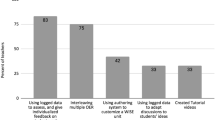Abstract
eScience has emerged as an important framework for dramatically rethinking the conduct of scientific research using information technology. There is an unparalleled opportunity for the international eScience and digital library communities to create shared infrastructure to support the conduct of science from end-to-end; i.e., from hypothesis generation, to collecting and analyzing scientific data, to the reporting of research outcomes, and the inclusion of scientific data and models in teaching and learning processes. For this vision to be realized, the two communities must establish a shared vision and research agenda encompassing several critical dimensions, including differences in theoretical and methodological approaches, and collaboration goals. Additionally, for the benefits of eScience and digital libraries to be fully realized, it is vital to establish a shared vision of the broader impact of this work for educators, learners, and the general public.
Similar content being viewed by others
Author information
Authors and Affiliations
Editor information
Editors and Affiliations
Rights and permissions
Copyright information
© 2005 Springer-Verlag Berlin Heidelberg
About this paper
Cite this paper
Sumner, T., Heery, R., Hunter, J., Lossau, N., Wright, M. (2005). Does eScience Need Digital Libraries?. In: Rauber, A., Christodoulakis, S., Tjoa, A.M. (eds) Research and Advanced Technology for Digital Libraries. ECDL 2005. Lecture Notes in Computer Science, vol 3652. Springer, Berlin, Heidelberg. https://doi.org/10.1007/11551362_42
Download citation
DOI: https://doi.org/10.1007/11551362_42
Publisher Name: Springer, Berlin, Heidelberg
Print ISBN: 978-3-540-28767-4
Online ISBN: 978-3-540-31931-3
eBook Packages: Computer ScienceComputer Science (R0)




